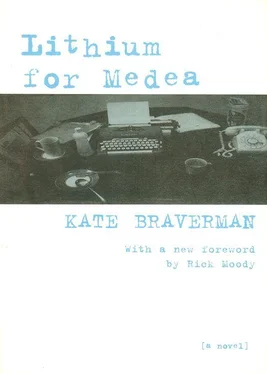AGAIN.
I read the story again. I glanced at my father. He was staring at the ceiling.
AGAIN WITH DRAMATIC EMPHASIS.
I read the story a third time, taking appropriate pauses, making certain sentences leap out of my mouth, small plumed birds with a life of their own. And I thought, go fly off, find treetops, build strong nests, drift intoxicated eating berries and blue air.
KID PULLED A BAD HAND, my father wrote. He paused, the pen gripped between his fingers. like me. He dropped his felt-tipped pen to the floor. A tear slid out of his eye and careened down his cheek. It disappeared in the cotton wrapped around his neck.
My father was lying very still. Outside the window the lawn nodded rows of small white heads, sun-dazed buds, petals intricate, looking knitted.
“You know, you’re betraying your own philosophy,” I began, searching for and somehow finding Francine’s tone. I felt myself almost assuming her stance, legs planted wide apart, one tapered arm on her hip. “All those years after the first cancer. The twenty years I was growing up. You always said life was a grab bag, a sweepstakes. Live every minute because there are no guarantees.”
My father seemed to be watching the sunlight reluctantly dragging itself through the Venetian blinds. I thought he was listening.
“You taught me that, Daddy. I remember. We still lived together. We had just come out here, the same time as the Dodgers. It was before Chavez Ravine. Remember? We watched them play at the Coliseum. I remember the whole team, Daddy. Snyder, Hodges, Wally Moon, Gilliam, Charlie Neal, Roseboro. We had Koufax and Drysdale then.”
NOTHING TEAM.
“I know. I’m just remembering when we lived together. You sat in the backyard at night, watering the peach tree and listening to the blue jays. You were always out there watching something. The yard. The sky. You were just glad to be alive. You took a joy in everything.”
THOUGHT I HAD IT LICKED FOREVER, my father wrote. I held his hand. After a while he closed his eyes.
I walked into the corridor. I needed a cigarette. I usually smoked in an alcove directly across the corridor from where the morphine was kept. Whenever I lit a cigarette, a nurse or doctor would suddenly appear at my shoulder and tell me no one on the third floor smoked, from the head doctor through the floor sweepers. They saw what cancer was, saw it every day.
What was cancer, anyway? It was ancient as the hills, the stones, original sin. It spawned in the morning of factory whistles, iron and coal and steel and gray stone blocks, streetcars, black scars of train tracks like black rows of stitches.
Perhaps the wild cancer cells had taken for their pattern the spoiled horizon, the low thick banks of poisonous clouds, the slow rivers absolutely dead beneath soap bubbles, rusting tin cans and old bottles. Perhaps it was the final legacy of generations born with chips of bronze in their lungs, the soot from chimneys and city curbs. Was it surprising that the body erupted, spewing contagion?
I lit a cigarette. I imagined the disease blowing like a red volcano in the center of my father’s throat. It grew like the sagebrush and yucca, the natural vegetation of the Los Angeles basin. Perhaps it gained entry through pores and pushed roots in, tentative at first and then taking hold, gripping the soft flesh linings and opening buds. The doctor said it was growing inside him for two years. Two years he walked with it, slept with it, ate and fed it. For two years he lived with a seedling death crop pushing up stalks inside him. Two years of it spewing cells in a mad fuck of death.
Suddenly I realized that he must have sensed it, some faint taste of webbing, some shadowy perception of inhabitation. He hid it. He wore it like a special jewel inside, a small sun, a tight little secret that warmed him. He must have felt the thorns in his cheeks and tongue and the splinters as the seedling pod exploded. Perhaps he sensed the invasion and bent into its special warmth and radiance after a decade of loneliness.
Once the gray-haired man was sage. But my father spent his gray-haired years alone. I went to Berkeley with Gerald. I crouched half dead in Venice with Jason. And my father turned gray as the storm that spends itself above a gray sea, two hundred miles from landfall spilling its promise into indifferent gray waves. He aged. His tribe disintegrated, savaged by the place called Los Angeles and the events that just happened, the things called fate and chance.
“I’m hip to Francine,” I remembered my father explaining. It was the night before he went to the hospital. It was the night I found him collapsed on his kitchen floor. “We were both hipsters, your mother and I. She was some kind of sixteen-year-old street bum. I was thirty-five. I knew it couldn’t go on forever. The cancer blew it. Upset the balance.
“And she was crazy. I always knew that. Like uncentered, out of kilter. She picked me up on a street corner, hustling dinners. I told her you’re one tired kid. You’re six months out of a whorehouse. She believed me. She saw I had savvy. I said, I’ll marry you, kid. What the hell? Any port in a storm, right?
“She had a father thing, a complex from being deserted. When I got sick the first time, she had to quit being a kid. That’s what she was, too. A kid. Playing house with you all day.
“She took it personally when I got sick. I can see her point. We were gamblers. She took a flier and won big. Still, for such a big winner she’s really pathetic,” my father said that night before he entered the hospital, the night he was drinking bourbon from the bottle, the night the world began crashing down.
“I’ll never forget the first time,” Francine told me once. “They were wheeling him into surgery. He looked up and said, sorry, kid. Don’t look back. Keep your shoulders squared and keep going. As they pushed him into the operating room, he reached out and grabbed my ass. They wheeled him in laughing.”
I began walking down the corridor. Everywhere a muted insistent humming clung to the layers of slow-moving fluids drip, drip, dripping through bottles and tubes. Patients were hidden behind greenish shadows, their blinds pulled closed. The slow fluids oozed. The televisions stuck high in the walls leaked their soft radioactive blue glow, a kind of death lash.
I could almost understand their dreams. They lie plugged in, rooms dim, and imagine their poor ruined flesh has finally fallen off and they are at last dry of all the human rot. They wish to dry even thinner, thin as the skin of fish, but something catches them. They fight back then, fight the taut string and the sensation of hanging. They taste salt and a terrible yearning for the cracking spines of waves poised like sentries guarding the sea gates and chimes, the soft channel down into spinning purple. Finality. The sea floor.
I peeked into my father’s doorway. He was sleeping. I crossed the corridor quickly, trying not to look into the room where the morphine trays sat. I told myself I could pass the room and feel nothing, feel nothing.
In the hospital cafeteria the light was sharp and white and the whole world was a kind of bas-relief. A large round clock was fastened to the wall above my shoulder, a device implanted surgically in plaster. I heard it ticking/breathing. Hours passed.
Francine walked in. She had changed clothing. She was wearing a white tennis skirt. Her legs were long, tanned. A doctor watched her walk. A busboy froze as she passed.
“You look at my tennis racket like a personal offense,” Francine observed. She sat down. She brought her face very close to mine. Her eyes were agate, flecked and somehow windy.
“You don’t know anything, kid. One thing I’ve learned from all this is to live while you can. Fred knows that. He’s a very vital man. He should be. He’s only forty.”
Читать дальше












